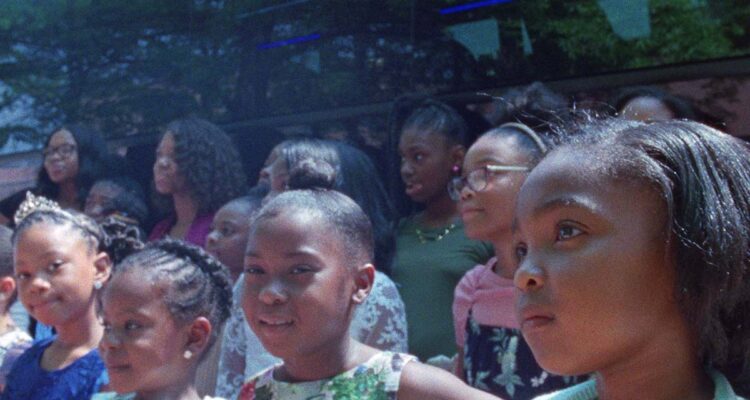It’s safe to assume that, were one to simply look at the film’s runtime or consider the basic concept surrounding the documentary “Daughters,“ there’s presumably much more to this than a simple film about a Father-Daughter dance organized for one particular group of incarcerated men and their children, separated by prison walls and an ocean of distance both physically as much as emotionally. Such dance events are commonplace; normally held annually as a way for fathers to bond with their young girls within a setting not unlike a homecoming dance or prom, most could be seen as little more than an excuse for a large group of children to burn off energy as they dash around a gymnasium to any number of DJ-provided pop hits, but there are equal parts undeniable connections made throughout the course of the evening as well as a memory both will, in all likelihood, forever cherish.
READ MORE: Sundance 2024: The 23 Most Anticipated Movies To Watch
“Daughters“ takes this concept, referred to as the “Date With Dad, “program and which is now in its 12th year, on a complete journey of exploration, profiling everyone from the men behind bars, the girls themselves, and even the wives, all of whom have a vast amount of musings on their respective situations as much as the upcoming dance. There’s Aubrey, cute as a button and as talkative as she’s smart; she’s also a perfect example of how these offspring understand their fathers’ predicament(s) and the passage of time since they were a family on the outside. Hearing the story of her father’s overnight arrest couldn’t be any more heartbreaking, but Santana’s introduction is a close contender, as her downtrodden thoughts about never wanting to have children of her own for self-evident reasons, coupled with her reflection on how the years have seen her essentially take on the role her father should be inhabiting. Raziah, in a similar fashion, can’t help but tearfully express her sadness over the lack of day-to-day interaction with her dad and subsequent behavioral issues that have manifested as a result, while Ja’Ana’s mother makes explicit mention of how, prior to the beginning of these sentences many of these men may have been mostly absent. This seems to serve as a trickle-down effect, with the onscreen implication that the majority of these mothers may apparently be telling their daughters that there’s no real need for a father figure, but when the girls openly state how needed that person is to each of them, it becomes even more clear how important this program, this dance, and the benefit to the relationship it all has become.
From within the confines of the prison, however, the film consistently checks in on a help group that serves as both a sanctuary for the inmates as they verbalize their own personal views on what it means to be a father, as well as fulfilling the necessary requirement of taking part in the group so these men can attend the dance. Few mentions are made as to the reasons for their incarceration, and group leader Chad demonstrates his skill at drawing backstories, personal views on their worth and value they could provide and just as much sadness over their own separation from the children they miss. Redemption, it would seem, is the presumed endgame here; some haven’t seen their children in nearly a decade, largely due to rules in place since 2014 which have served to mostly eliminate in-person visits and now attaching a monetary cost to any outside calls. Many lament the fact that, despite their desire to the contrary, they’ve remained unable to steer clear of following in the footsteps of their own lawbreaking parents; it’s all of these moments that provide a lion’s share of emotion present throughout “Daughters.“
Obviously, the climax comes in the form of the big dance, occurring around the film’s midpoint; seeing the preparations taken on both sides has an undeniable air of excitement, even if it’s somewhat tempered by the images of the girls, adorned in dresses and makeup, having to endure prison security checkpoints and discussions amongst the group about whether to question their dads as to the details of the crimes that put them where they are now. Reunions between fathers and daughters, specifically the four profiled, are as understandably emotional as expected, and the actual dance itself couldn’t be more like those found in any school gym, complete with a professional photographer and well-decorated tables for all to sit and talk. Though the event ends just as quickly as it begins, it’s not without its share of joyful activity and a particularly gut-wrenching moment when all fathers are instructed to give their carnations to their children as a symbol of their commitment to each of them before parting ways in a manner that sees tears flowing freely from all. It isn’t long after the conclusion that the men find themselves back in the group setting, providing feedback on what this dance has meant and what steps they’ll take going forward.
Directors Natalie Rae and Angela Patton have taken a truly specific, unique subject, one that any parent who’s attended a similar event could relate to, and thrust it through a portal into a world many might not understand. The sympathy should be placed firmly upon the girls, but “Daughters “can’t help but generate undeniable feelings of hope as one looks ahead into the future of these men. This is far from the sort of cinematic experience one revisits time and time again, and it’s clear that’s not the intention; one viewing is all it takes to leave a lasting impression, like the simple memory of a young girl dancing with her dad. [A-]
Follow along for all our coverage of the 2024 Sundance Film Festival.

